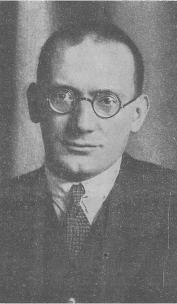Ernst Gruenfeld
| Ernst Franz Grünfeld | |
|---|---|
 |
|
| Full name | Ernst Franz Grünfeld |
| Country | Austria |
| Born |
November 21, 1893 Austria |
| Died | April 3, 1962 (aged 68) |
Ernst Franz Grünfeld (November 21, 1893 – April 3, 1962) was a leading Austrian chess grandmaster and chess writer, mainly on opening theory.
Grünfeld was born in Josefstadt, Vienna. He lost a leg in his early childhood, which was beset by poverty. However, he discovered chess, studied intensely, and quickly earned a reputation as a skilled player at the local chess club, the Wiener Schach-Klub.
The First World War (1914–18) seriously affected Grünfeld's chances of playing the best in the world as few tournaments were played during this troubled period. He was reduced to playing correspondence matches and spent much of his spare time studying opening variations. He started a library of chess material which he kept in his small Viennese flat until his death at the age of 68 in 1962.
He developed a reputation as an expert on openings during the 1920s and success over the board soon followed. He was 1st= in Vienna (1920) with Savielly Tartakower; 1st in Margate (1923); 1st in Meran (1924); 1st in Budapest (1926) with Mario Monticelli; 1st in Vienna (1927) and he shared first spot in the Vienna tournaments of 1928 and 1933 (Trebitsch Memorial)—the former with Sándor Takács and the latter with Hans Müller; and finally he was 1st in the tournament at Ostrava of 1933. He also won in the 23rd DSB Congress at Frankfurt 1923.
During the Bad Pistyan (Piešťany) tournament of April 1922 Grünfeld introduced his most important contribution to opening theory—the Grünfeld Defence. He played the defence against Friedrich Sämisch in round 7, drawing in 22 moves, and later that year he used it successfully against Alexander Alekhine in the Vienna tournament. However, he did not play the opening frequently.
...
Wikipedia
